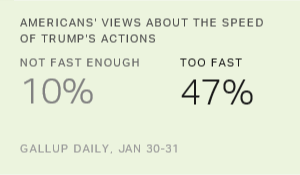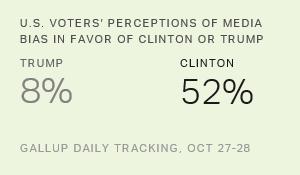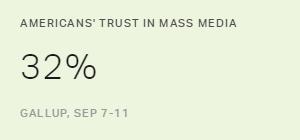Story Highlights
- 36% think media has been too tough, 28% say not tough enough
- Nearly three-quarters of Republicans say media has been too tough on Trump
- Democrats divided between saying coverage about right, not tough enough
WASHINGTON, D.C. -- In the wake of several contentious encounters between President Donald Trump's White House and the national press corps, Americans disagree on the news media's coverage of the new president and his administration. Just over a third of Americans (36%) think the media has been too tough on Trump, while just under a third (31%) think it has been about right and 28% say it has not been tough enough. Republicans overwhelmingly believe the media has been too tough on Trump.
| Too tough | About right | Not tough enough | No opinion | ||||||||||||||||||||||||||||||||||||||||||||||||||||||||||||||||||||||||||||||||||||||||||||||||
|---|---|---|---|---|---|---|---|---|---|---|---|---|---|---|---|---|---|---|---|---|---|---|---|---|---|---|---|---|---|---|---|---|---|---|---|---|---|---|---|---|---|---|---|---|---|---|---|---|---|---|---|---|---|---|---|---|---|---|---|---|---|---|---|---|---|---|---|---|---|---|---|---|---|---|---|---|---|---|---|---|---|---|---|---|---|---|---|---|---|---|---|---|---|---|---|---|---|---|---|
| % | % | % | % | ||||||||||||||||||||||||||||||||||||||||||||||||||||||||||||||||||||||||||||||||||||||||||||||||
| U.S. adults | 36 | 31 | 28 | 5 | |||||||||||||||||||||||||||||||||||||||||||||||||||||||||||||||||||||||||||||||||||||||||||||||
| Republicans | 74 | 17 | 6 | 3 | |||||||||||||||||||||||||||||||||||||||||||||||||||||||||||||||||||||||||||||||||||||||||||||||
| Independents | 37 | 31 | 26 | 7 | |||||||||||||||||||||||||||||||||||||||||||||||||||||||||||||||||||||||||||||||||||||||||||||||
| Democrats | 9 | 40 | 49 | 2 | |||||||||||||||||||||||||||||||||||||||||||||||||||||||||||||||||||||||||||||||||||||||||||||||
| Â鶹´«Ã½AV Daily, Jan. 30-31, 2017 | |||||||||||||||||||||||||||||||||||||||||||||||||||||||||||||||||||||||||||||||||||||||||||||||||||
Trump's team has battled some media estimates of the size of his inauguration crowd, media descriptions of Trump's executive order on immigration and refugees as a "Muslim ban," and one reporter's assertion that Trump removed a bust of Martin Luther King Jr. from the Oval Office, which the White House refuted. Meanwhile, Trump has been on the defensive for his team's reliance on "alternative facts" and his assertions of voter fraud in the November election, which The New York Times deemed a "lie."
It is against this backdrop that nearly three in four Republicans (74%) say the media has been too tough on Trump. Democrats, on the other hand, are more divided, with 49% saying the media has not been tough enough and 40% saying its coverage has been about right.
The public's mood, according to this late January poll, differs from that in January 2009, thought the news media had been too tough on newly elected President Barack Obama. Nearly half (48%) thought the media was about right in its coverage of Obama and his administration, while 38% said it was not tough enough.
As is the case today, Republicans were more likely than Democrats to be unhappy with the media: In 2009, 65% of Republicans thought the media was not tough enough on Obama, while 66% of Democrats thought it was about right.
| Too tough | About right | Not tough enough | No opinion | ||||||||||||||||||||||||||||||||||||||||||||||||||||||||||||||||||||||||||||||||||||||||||||||||
|---|---|---|---|---|---|---|---|---|---|---|---|---|---|---|---|---|---|---|---|---|---|---|---|---|---|---|---|---|---|---|---|---|---|---|---|---|---|---|---|---|---|---|---|---|---|---|---|---|---|---|---|---|---|---|---|---|---|---|---|---|---|---|---|---|---|---|---|---|---|---|---|---|---|---|---|---|---|---|---|---|---|---|---|---|---|---|---|---|---|---|---|---|---|---|---|---|---|---|---|
| % | % | % | % | ||||||||||||||||||||||||||||||||||||||||||||||||||||||||||||||||||||||||||||||||||||||||||||||||
| U.S. adults | 11 | 48 | 38 | 3 | |||||||||||||||||||||||||||||||||||||||||||||||||||||||||||||||||||||||||||||||||||||||||||||||
| Republicans | 3 | 27 | 65 | 5 | |||||||||||||||||||||||||||||||||||||||||||||||||||||||||||||||||||||||||||||||||||||||||||||||
| Independents | 10 | 45 | 43 | 2 | |||||||||||||||||||||||||||||||||||||||||||||||||||||||||||||||||||||||||||||||||||||||||||||||
| Democrats | 18 | 66 | 13 | 3 | |||||||||||||||||||||||||||||||||||||||||||||||||||||||||||||||||||||||||||||||||||||||||||||||
| USA Today/Â鶹´«Ã½AV, Jan. 30-Feb. 1, 2009 | |||||||||||||||||||||||||||||||||||||||||||||||||||||||||||||||||||||||||||||||||||||||||||||||||||
The divergence between Republicans' and Democrats' views on media coverage of the president reflects the broader skepticism rank-and-file Republicans have of the news media. Â鶹´«Ã½AV trends have long shown fewer Republicans than Democrats expressing high levels of to report the news "fully, accurately and fairly." This deficit swelled in 2016 as GOP confidence in the press plummeted to 14%, down from 32% in 2015.
Bottom Line
Americans as a whole are split in their assessments of whether the news media is covering the Trump administration fairly. However, this masks broad disapproval among Republicans, who mostly believe the media -- which Trump has declared "the opposition party" -- is being too hard on the new Republican president. Meanwhile, about half of Democrats think the media should be tougher on Trump.
These data are available in .
Survey Methods
Results for this Â鶹´«Ã½AV poll are based on telephone interviews conducted Jan. 30-31, 2017, on the Â鶹´«Ã½AV U.S. Daily survey, with a random sample of 1,018 adults, aged 18 and older, living in all 50 U.S. states and the District of Columbia. For results based on the total sample of national adults, the margin of sampling error is ±4 percentage points at the 95% confidence level. All reported margins of sampling error include computed design effects for weighting.
Each sample of national adults includes a minimum quota of 70% cellphone respondents and 30% landline respondents, with additional minimum quotas by time zone within region. Landline and cellular telephone numbers are selected using random-digit-dial methods.
View survey methodology, complete question responses and trends.
Learn more about how the works.




